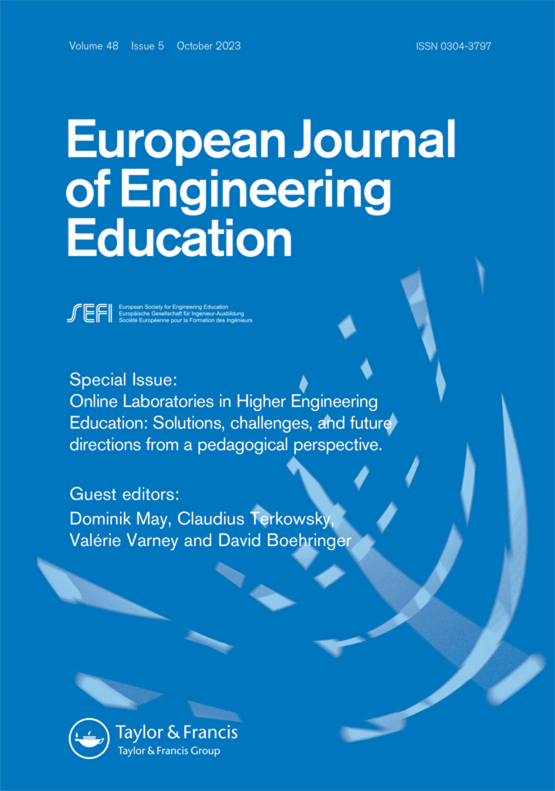Submit a Manuscript to the Journal
European Journal of Engineering Education
For a Special Issue on
Emotions in Engineering Education: Widening perspectives in a rapidly growing field of research
Abstract deadline
15 November 2023
Manuscript deadline
15 June 2024

Special Issue Editor(s)
Johanna Lönngren,
Umeå University, Sweden
[email protected]
Inês Direito,
University College London, UK
[email protected]
Emotions in Engineering Education: Widening perspectives in a rapidly growing field of research
Guest Editors
Co-Leading Guest Editors:
- Inês Direito, University College London, Great Britain ([email protected])
- Johanna Lönngren, Umeå University, Sweden ([email protected])
Guest Editors:
- James Huff, Harding University, USA
- Nihat Kotluk, École Polytechnique Fédérale de Lausanne, Switzerland
- Khairiyah Mohd-Yusof, Universiti Teknologi Malaysia
- Madeline Polmear, Vrije Universiteit Brussel, Belgium
- Roland Tormey, École Polytechnique Fédérale de Lausanne, Switzerland
- Idalis Villanueva Alarcón, University of Florida, USA
Aims and objectives
This special issue of the European Journal of Engineering Education aims to strengthen the emerging research field focusing on emotions in engineering education by showcasing a rich collection of novel empirical research on emotions in engineering education. This call is primarily directed at empirical and methodological articles that can broaden the scope of research on emotions in engineering education beyond the currently dominant topics of socio-emotional competences, empathy, anxiety, and academic emotions (unless they are connected to less dominant topics in novel ways). Articles describing studies that employ in-depth qualitative, physiological, and/or mixed-methods approaches will be prioritized. Theoretical articles may also be considered if they apply or develop currently under-represented theoretical perspectives (e.g., sociological or critical theories of emotion). The study context is engineering education at any level, including higher (tertiary) education, K-12, informal education, and work-based education.
For this special issue we welcome research on a wide range of topics, but the following ones are of particular interest, given they focus on emotions in engineering education:
- Cognitive processes
- International and cultural perspectives
- Socialization and discourses
- Well-being
- Ethics and morality
- Decision-making and action
- Identity and sense of belonging
- Sustainability and wicked problems
- Novel methodological or theoretical approaches
- Novel ways of representing data or research findings
About the theme
Emotions play an important role in teaching and learning in engineering education, and interest in the topic is rapidly increasing. However, the emerging body of research on emotions in engineering education is dispersed and few authors cite work from others in the field (Lönngren et al., forthcoming). In addition, the scope of existing research is rather narrow (Lönngren et al., 2023): a large majority of the published studies focuses on emotional intelligence and other socio-emotional competencies (e.g., Bhave et al., 2020; Lappalainen, 2015), followed by research on empathy (e.g., Bairaktarova & Plumlee, 2022; Hess et al., 2020; Walther et al., 2017), anxiety (e.g., Bellinger et al., 2015; Ecciux Wellmann & Barragán G., 2016), and academic emotions (e.g., Fritzsche et al., 2018; Villavicencio, 2011). Further, most research has been conducted in higher education contexts, indicating important research gaps in primary, secondary, and non-formal education (Lönngren, Bellocchi, et al., 2021).
Explicit engagement with theories of emotion is today rare and typically limited to cognitive appraisal theories of emotion (Lönngren et al., forthcoming), such as multi-componential theory (Scherer, 2005) and control-value theory (Pekrun, 2006). Research employing sociological and critical perspectives is largely absent, even though such theories are commonly used to in the wider education literature (Chubbuck & Zembylas, 2008; Zembylas & Schutz, 2016). For example, Hochschild’s (1979, 1983) work on feeling rules (norms regarding which emotions one is expected to feel and express) and emotional labor (the effort one exerts to express “appropriate” emotions at work) has lately received increasing attention in the sociological education literature (Wang et al., 2019).
Even in terms of research methods, we see great potential for the field to engage with a broader range of methods for data collection and analysis. Most published studies today rely on self-report measures, that is, participants reporting on their own emotions, often through questionnaires or interviews (Lönngren, Bellocchi, et al., 2021). Self-report measures provide convenient and resource-efficient approaches to quantifying the presence or absence of specific emotions and socio-emotional competences, but they have also been criticized for sometimes producing unreliable results and neglecting interactional dimensions of emotions (Pekrun & Bühner, 2014; Shuman & Scherer, 2014). The field would also benefit from more research employing in-depth qualitative methods to explore questions related to the why and how of emotions in engineering education. In-depth interviews, field observations, and multimodal analysis can provide useful approaches for such research (e.g., Huff et al., 2021; Kellam et al., 2018; Lönngren, Adawi, et al., 2021; Villanueva Alarcón & Anwar, 2022). Finally, physiological methods can contribute real-time information on the intensity of participants’ emotions (e.g., Villanueva Alarcón et al., 2018).
Looking to Publish your Research?
Find out how to publish your research open access with Taylor & Francis Group.
Choose open accessSubmission Instructions
Extended abstracts should be anonymized and limited to 800-1000 words, plus references and any supplementary files (optional). Format is free.